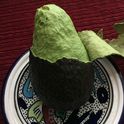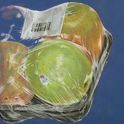What's the best way to clean a food processor?
I can never access all the little grooves and knobs where garlicky pestos hide.
28 Comments
healthierkitchenJune 30, 2016
Sarah - another thought for cleaning in small areas is a bottle brush set. They are meant for cleaning baby bottles and often come with a really skinny attachment. It's also great for cleaning in the small areas of a water bottle mouthpiece!
healthierkitchenJune 30, 2016
along these lines: http://www.bedbathandbeyond.com/store/product/oxo-good-grips-reg-water-bottle-cleaning-3-piece-set/1040624211?Keyword=bottle+brush
StephanieJune 30, 2016
Agreed! And along those lines - a stiff, cheap paintbrush from a craft store.
PHILJune 27, 2016
Wet the area if you can with white vinegar or water , or whatever cleaner you like, then take a piece of paper towel , and put it over the area you want to clean, take the point of the steak knife and push the paper towel into the grove and slide the paper knife down the groove dragging the paper towel through the groove. I hate when stuff gets in the seams and will spend a ridiculous amount of time trying to clean it out. I do the same thing in my car. BE CAREFUL, no pressure so the knife doesn't slip on you. let me know if it works. Also, a tiny screwdriver like you use to tighten your glasses works if you have one.
BerryBabyJune 28, 2016
I use toothpicks to clean cracks and crevices. Still remember a home ec teacher who taught us how to clean a refrigerator's interior and used toothpicks to clean the rubber around the door. To this day I use them all over the kitchen.
SMSFJune 27, 2016
Sarah, in that case, I'd go with BerryBaby's suggestion above and soak the cover in hot, soapy water for a while, then use a brush to scrub.
BerryBabyJune 27, 2016
Thank you, SMSF! Always wash the food processor bowl and components by hand. I recall that the instruction book recommended handwashing to dishwasher as the plastic will 'cloud' in the dishwasher. Guessing the hot...water and heat dry would cause it. After each use, I wipe down the controls and stand. Looks as good as the day I received it as a gift and that was over 10 years ago.
SMSFJune 27, 2016
Sarah, can you clarify your question? Are you asking about the bowls/blades/cover or about the machine/motor unit?
ChefJuneJune 27, 2016
The motor is not meant to be "cleaned" by a user.
SMSFJune 27, 2016
Hi ChefJune,
The motor itself, of course not! I was thinking that Sarah may have been asking how to clean off the motor housing (with the buttons, etc.) which is a different question than how to clean the bowl/blades/cover.
The motor itself, of course not! I was thinking that Sarah may have been asking how to clean off the motor housing (with the buttons, etc.) which is a different question than how to clean the bowl/blades/cover.
Sarah J.June 27, 2016
I'm asking mostly about the cover! There are so many little chambers for gunk to get stuck in, and I don't have a dishwasher to clean it thoroughly. I often find bits of dried pesto in weird places—not so desirable when I'm trying to grind almonds!
ChefJuneJune 27, 2016
Sarah: soak the lid before you piddle with a toothbrush or something similar. I find that usually works. Do you have a flat lid for your processor? I have one that I use when I am chopping or making dough or mayo. It is a lot easier to clean than the complex lid with all the long feed tube.
Sarah J.June 30, 2016
I don't have the flat top, ChefJune—only the really convoluted one.
amysarahJune 27, 2016
I agree about the dishwasher - mine went for 25+ yrs with very frequent use, cleaned that way regularly. Also, just a good soak in very hot soapy water often does the trick. (Try not to let any residue dry on it - soak immediately after using.)
RachelJune 27, 2016
I put a little water and a drop of dish soap in it and run for a few seconds, then dump out the water, scrub additionally where needed and rinse well.
ChefJuneJune 27, 2016
I always run it through the dishwasher. Mine is 32 years old and still going strong.
MicheleJune 28, 2016
Would you please, please share what make your dishwasher is???? I have gone through 4 in the last 16 years, and 2 of them were "top of the line". Possibly our super hard water is the killer but my husband is getting beyond the point in life where he can dismantle and fix them. So depressing. We are really careful, following instructions to the letter and still they are fall apart on us.
BerryBabyJune 28, 2016
Beware of dishwasher soap! ONLY use what the manufacturer recommends. We started using a store brand and it was too harsh for our machine. The repair person was adamant about using what is recommended as the companies research ingredients and compatibility for their washers. We learned the hard way. That may possibly be what you've encountered? Life expectancy is 6-12 years with 8 being average. Hope this helps a bit. BB
702551June 28, 2016
"Beware of dishwasher soap! ONLY use what the manufacturer recommends."
The plumbers I have used respectfully disagree. Different locations have vastly different water quality levels. Where I work, the water is well known to be very hard.
I live 10 miles away from where I work, on a different water system. The water at home is one of the finest municipal water sources in the USA, SFPUC (a.k.a. "Hetch Hetchy").
The same detergent will not behave the same way, and the plumber who recently repair our office dishwasher pointed this out very explicitly.
At home, I don't even worry. I use way less than what the manufacturer's recommendation is. It doesn't matter about brand, whether or not it's liquid or powder. I don't use rinsing/anti-spotting agents either. It doesn't matter, my dishes are pretty much perfect EVERY SINGLE TIME because the water quality is awesome.
The only thing I need to worry about is to rinse away herb fragments since my cheapo unit tends to spray those around. I lived in another place with a better dishwasher (same water) that didn't do this.
The plumbers I have used respectfully disagree. Different locations have vastly different water quality levels. Where I work, the water is well known to be very hard.
I live 10 miles away from where I work, on a different water system. The water at home is one of the finest municipal water sources in the USA, SFPUC (a.k.a. "Hetch Hetchy").
The same detergent will not behave the same way, and the plumber who recently repair our office dishwasher pointed this out very explicitly.
At home, I don't even worry. I use way less than what the manufacturer's recommendation is. It doesn't matter about brand, whether or not it's liquid or powder. I don't use rinsing/anti-spotting agents either. It doesn't matter, my dishes are pretty much perfect EVERY SINGLE TIME because the water quality is awesome.
The only thing I need to worry about is to rinse away herb fragments since my cheapo unit tends to spray those around. I lived in another place with a better dishwasher (same water) that didn't do this.
BerryBabyJune 28, 2016
cv, I appreciate your input. However, we found out that many generic dishwasher soaps contain 'sand' which is what caused our problem. Wikipedia has a very good information on dishwasher soaps and their content. I do agree that water quality is surely an issue but in our case it wasn't, it was the soap. Less expensive soap ended up costing us more $'s than it was worth.
702551June 27, 2016
I use a toothbrush to remove any debris then toss it into the dishwasher. That has worked like a charm for 20+ years.
ChefJuneJune 27, 2016
Unless your dishwasher is ancient, there's no need for the toothbrush. :)
702551June 27, 2016
I mostly agree with you, however I found that the cheapo dishwasher that the previous tenant installed tends to spray herb fragments all around. I find it easier to rinse after I've made pesto-like things in my food processor.
I've lived in other places where the dishwasher was more adept and handling this.
I've lived in other places where the dishwasher was more adept and handling this.
BerryBabyJune 28, 2016
You may want to try dishwasher cleaner. It costs about $5.00 and you find it either by the cleaning supplies or some have it near the dishwasher soap. You put the entire bottle on the top shelf of an empty washer and run it according to directions on the bottle. Or, you can place a cup of white vinegar on the top shelf tray and run it on hot. Both clean your dishwasher thoroughly .
702551June 30, 2016
I already do an occasional dishwasher cleaning with white vinegar. That's not the issue. The issue is that my cheapo dishwasher's poor design has a tendency to spew herb flakes.
If there are no herb flakes on the items, the items come out fine. As I noted before I've lived in other places with better dishwashers, wasn't a problem there.
Plus, the water in my place is fantastic, one of the best municipal water sources in the entire nation.
If there are no herb flakes on the items, the items come out fine. As I noted before I've lived in other places with better dishwashers, wasn't a problem there.
Plus, the water in my place is fantastic, one of the best municipal water sources in the entire nation.
BerryBabyJune 27, 2016
I fill the sink with hot, soapy water and let it sit for about 15 minutes. Then use a brush on the crevices and give it a good spray rinse.
NancyJune 27, 2016
Possibly use toothbrush, baking soda, one of those spray cleaners from hardware store or grocery store.
On other hand, worried about getting cleaners in between the parts.
Does the manufacturer offer any tips, in manual or online?
On other hand, worried about getting cleaners in between the parts.
Does the manufacturer offer any tips, in manual or online?
NancyJune 27, 2016
Sarah - FYI recommendation for spray cleaner was for the housing/outside base of processor, when I thought that was your question. So totally inappropriate for bowl, lid, other parts that come in contact with food.
Showing 28 out of 28 Comments
Recommended by Food52
Popular on Food52
Continue After Advertisement







